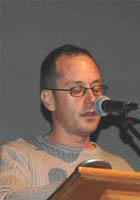The Mercenary Poem by Charl-Pierre Naudé
The Mercenary
The former SADF soldier is a mercenary these days
and thus well-equipped, in a manner of speaking,
to approach the same issue from opposite sides.
"It was end of the rainy season in Mozambique," he told me
on the high plateau, where he now hunts cattle thieves.
"Blank curtains of water would still drop from the sky;
the most devastating phase of the war was behind.
Soft trunks, of the vanishing forest - of humans too -
were fermenting in the dank ground and marshlands . . . "
An undertow of rapture, maybe awe, in his voice.
" . . . I was with a regular patrol
on a desolate stretch
when we spotted this figure alongside the road.
He was walking very fast and determinedly,
a calabash of sorts swinging from an arm,
tossing his palms in front of his mouth very lightly
and blowing into them, every now and then.
It's never really cold in those reaches, though -
as if stopping, to play with a die,
maybe to alleviate a long mission's tediousness.
Tied to his back: a corrugated iron sheet; a quiver with kindle.
As we drove past he seemed to be muttering,
and oblivious of others
fell to his knees suddenly.
The war had created many forms of insanity . . .
moments later up and walking on, more concertedly,
falling to his knees in the distance again, as I looked back.
One of the other guys in the armoured vehicle hastily
crossed his heart seeing such apparent, fervent Hail Marys:
there are not too many ways to get to a destination . . .
Two days later, on the way back, we passed him again
fifty kilometres north from the first time.
I wondered from how far south he'd been coming,
who he was talking to so incessantly and lovingly
in the butterfly locket of his hands.
A sweetheart?
Many had lost all their loved ones in that war.
I saw him stop dead, to cradle the air in his palms, maybe
a small animal I thought, a hamster, first in his crotch
then in an armpit, against a sudden flaring of the breeze.
I went up closer, to where he was crouching at a crossroad,
heard him whispering ‘Almost there, almost there'
into his cupped hands. I know a bit of the language.
He looked scared stiff when he saw me next to him.
The locals avoid soldiers and try not to talk to them.
The others in the Unimog kept smirking at the madman.
I asked him to show me what was in his hands.
He held out his calloused palms reluctantly.
It was an ember.
The razed village he came from had no more fire
and he was chosen to fetch it, eighty kilometres on.
He'd braved bullets and risked his life to scoop the carbon-winged fledgling
from a fallen frieze, in a church that had just been mortarred.
Nights he would rest, make a fire; next morning
set out again, the best coals in his earthenware pot,
ending each night the leg of his journey
blowing on the last embers and carefully
pealing each one, out of its shawl of ash.
This he confessed to me in a fearful tone
with slain eyes, as if I were interrogating him . . .
And I could picture him sleeping, half awake and curled up
with his breathing charge next to him swaddled in her own glow -
a lover, that freight of light bones in her moody nightdress.
I wished the man good luck, gave his shoulder a press
while he blew into his hands again fanning on
the small goddess,
his precious pet, Prometheus' fire."
This poem has not been translated into any other language yet.
I would like to translate this poem